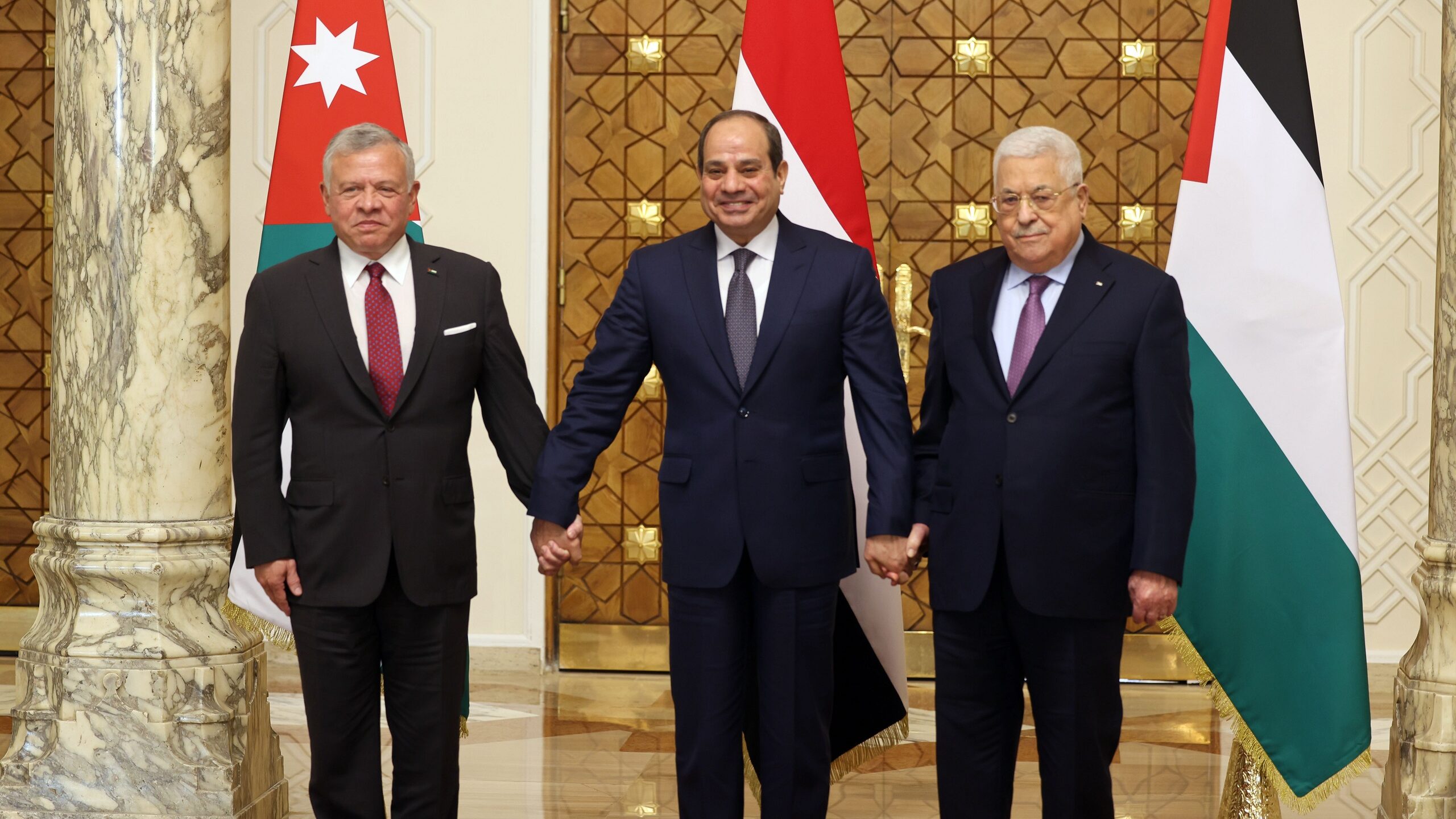Egyptian President Hosts King of Jordan, PA President for Tripartite Summit
The meeting is taking place just days after PA President Abbas fired nearly all the authority’s governors
Egyptian President Abdel Fattah el-Sisi is hosting King Abdullah II of Jordan and Palestinian Authority (PA) President Mahmoud Abbas in the Egyptian city of New Alamein on Monday.
WAFA, the official Palestinian news agency, reported that the leaders will use the tripartite summit to coordinate their positions on the Palestinian issue ahead of Abdullah’s upcoming visit to the US.
We hope the Saudis stick to their guns and insist on Israel agreeing to the Arab peace initiative of 2002 in exchange for normalization
A Palestinian official accompanying Abbas told The Media Line that a Saudi official may attend the meeting, which is being held amid reports of an impending US-brokered normalization deal between Saudi Arabia and Israel.
“We hope the Saudis stick to their guns and insist on Israel agreeing to the Arab peace initiative of 2002 in exchange for normalization,” the official, who requested to remain anonymous, said.
The Arab Peace Initiative, also known as the Saudi Initiative, was proposed by Saudi Crown Prince Abdullah at the 2002 Arab League Summit in Beirut. The initiative, which was endorsed unanimously by the Arab League, proposed a resolution of the Palestinian-Israeli conflict and full normalization of relations between Arab countries and Israel in exchange for full Israeli withdrawal from the Golan Heights, the West Bank, including East Jerusalem, and Gaza, as well as resolution of the Palestinian refugee issue according to UN General Assembly Resolution 194.
On Saturday, Saudi Arabia appointed its ambassador to Jordan, Naif bin Bandar Al-Sudairi, as the nation’s first ambassador to Palestine. The decision was formalized when Majdi al-Khalidi, a Palestinian presidential adviser for diplomatic affairs, accepted Al-Sudairi’s credentials during a meeting at the Palestinian Embassy in Jordan. Al-Sudairi is set to take on the role of consul general in Jerusalem as well.
He will maintain his base of operations in Jordan as a nonresident ambassador.
Officials in Ramallah view the appointment of Saudi Arabia’s first ambassador to Palestine as a positive sign.
According to WAFA, al-Khalidi described the appointment as “an important step that will contribute to further strengthening the strong brotherly relations that bind the two countries and the two brotherly peoples.”
Palestinians are concerned that Saudi Arabia may follow fellow Gulf states Bahrain and the United Arab Emirates in normalizing relations with Israel. They believe that a normalization deal will weaken the Palestinian political cause and open the door for more Arab and Muslim countries to establish diplomatic ties with Israel.
Abbas and Abdullah met in Amman last week. After returning from his brief visit to Jordan, Abbas fired most of the governors of the PA.
He dismissed the governors of eight West Bank governorates, as well as those of four Gaza governorates, whose position has been mostly symbolic since Hamas took over Gaza in 2007. Only three governors out of 15 were not removed.
Many were taken by surprise by Abbas’s decision, including the fired governors themselves, who learned of their fate from media reports.
Abbas gave no official explanation for the mass firing.
Everyone understands that the PA is now passing through a dangerous phase
Emad Abu Awaad, director of the Ramallah-based Al Quds think tank, told The Media Line that the decision signals Abbas’s recognition of the PA’s sinking popularity. Abbas likely fired the governors in response to public demand for change from the PA, Abu Awwad said.
“Everyone understands that the PA is now passing through a dangerous phase,” he noted, adding that Abbas is doing his best to promote the PA’s public image and maintain PA control.
The firing “comes in the context of organizing the internal Palestinian house with regard to succession, as well as appointing figures that are compatible with Abbas’s political approach,” he said.
The Palestinian president appoints governors to implement his policies and can replace them at any time.
Ramallah-based political analyst Esmat Mansour told The Media Line that Abbas’s visit to Jordan contributed to the speed with which he carried out the firings.
“It is not possible for the president to ignore Arab advice, as well as international demands, out of fear for the future and fate of the PA,” Mansour said.
Several PA officials told The Media Line that the decision to dismiss the governors was first made about two years ago amid the protests that took place after the killing of activist Nizar Banat.
Banat was a political and human rights activist who was publicly critical of the PA and Abbas. He died in 2021 after being violently arrested by PA security forces.
After Banat’s death and the resulting protests, PA officials decided to replace many of the authority’s governors and ambassadors. Officials who spoke to The Media Line explained that PA leadership put off implementing the decision in order not to appear to have conceded to protesters.
“The authority wanted to preserve its prestige and status and did not want to appear weak in front of the street and for the street’s demands to be raised,” Mansour said.
Public support for the PA was further damaged by a large Israeli raid on the Jenin refugee camp in July. One Israeli soldier and 12 Palestinians were killed during the two-day operation. The refugee camp sustained extensive damage from Israeli drones, helicopters, and bulldozers.
Public discontent with the current Palestinian leadership remains unexpressed politically, as the PA has not held presidential or parliamentary elections since 2006. Abbas’s original four-year term technically ended in 2009.
“Every day that passes with the lack of a political horizon, the accumulated mismanagement by the PA, and the growing economic problems puts the authority in a difficult situation and weakens it,” Mansour said.


